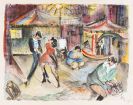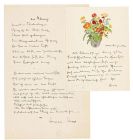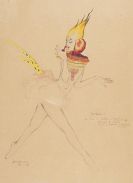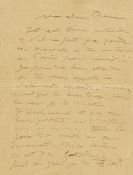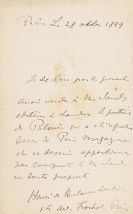
Albert Weisgerber
St. Ingbert
1878 -
Fromelles/Ypern
1915
Albert Weisgerber began an apprenticeship as a decorative painter in Frankfurt in 1894, but changed to the "Kunstgewerbeschule" in Munich in the same year. He studied at the "Akademie der Bildenden Künste" from 1897 to 1901, first under Gabriel Hackl, then under Franz von Stuck. He began working for the journal "Jugend" in 1897. Albert Weisgerber met Hans Purrmann, Paul Klee, Wassily Kandinsky, Willi Geiger and Gino Finetti in Stuck's painting class in 1898, the same year in which he founded "Sturmfackel", an association with members such as Alfred Kubin, Rudolf Levy and Alfred Lörcher.
Albert Weisgerber made naturalistic studies which were exhibited in the artist's first exhibition of the Munich Secession in the same year. Weisgerber spent much of the year 1903 in St. Ingbert where he painted his famous beer garden pictures. They reflect his interest in French Impressionism. His work for the journal "Jugend" took him to Paris a couple of times during 1905 to 1907, where he met Henri Matisse. His painting style was strongly influenced by Cézanne, Manet, Toulouse-Lautrec and Greco. A brighter palette is paralleled with a more two-dimensional effect and decorative style. His subjects during this period are mainly portraits as well as scenes from cafés and the theatre.
Weisgerber's international breakthrough came in 1906 when the "Städtische Galerie" Frankfurt and the Munich Pinakothek bought paintings. He travelled to Florence in 1909, where, influenced by Italian primitive art, he attempted a new beginning in his art. He was awarded the "Goldene Medaille" at the "X. Kunstausstellung" in Munich in the same year and had his first large one-man exhibition in Munich and Dresden in 1911.
His well-known painting of the "Munich Hofgarten" was made in this year. Albert Weisgerber changed his style of painting once again, however, turning towards a variety of religious subjects. Weisgerber had important exhibitions in 1912 at Paul Cassirer's in Berlin, at the "Kunsthaus Zurich "and at the "Sonderbund" exhibition in Cologne. He was a founding member and the president of the "Neue Münchener Secession" in 1913, which had members such as Alexej von Jawlensky, Paul Klee, Alexander Kanoldt and others. Weisgerber saw the first exhibition of the "Neue Münchener Secession" shortly before being drafted into the war in Autumn 1914.
He was killed one year later in the war.
Would you like to sell a work by Albert Weisgerber?
Infos for seller
